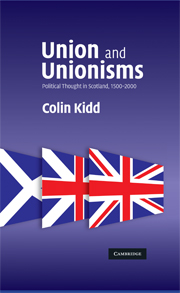Book contents
- Frontmatter
- Contents
- Preface
- 1 Introduction: the problems of Unionism and banal unionism
- 2 Unionisms before Union, 1500–1707
- 3 Analytic unionism and the issue of sovereignty
- 4 Narratives of belonging: the history and ethnology of organic union
- 5 From assimilationist jurisprudence to legal nationalism
- 6 The two kingdoms and the ecclesiology of Union
- 7 Early nationalism as a form of unionism
- 8 Conclusion
- Index
- References
4 - Narratives of belonging: the history and ethnology of organic union
Published online by Cambridge University Press: 06 July 2010
- Frontmatter
- Contents
- Preface
- 1 Introduction: the problems of Unionism and banal unionism
- 2 Unionisms before Union, 1500–1707
- 3 Analytic unionism and the issue of sovereignty
- 4 Narratives of belonging: the history and ethnology of organic union
- 5 From assimilationist jurisprudence to legal nationalism
- 6 The two kingdoms and the ecclesiology of Union
- 7 Early nationalism as a form of unionism
- 8 Conclusion
- Index
- References
Summary
The presupposition of most recent commentary on the Union – including the chapters preceding this one – is that Britain was the artificial conjunction of two long-established nations with distinctive cultures, identities and traditions. These differences were accommodated within the novel asymmetric structure of a mixed-unitary state which permitted the co-existence of separate church establishments and legal systems beneath the central authority of a single crown and parliament. It is an unchallenged feature of modern scholarship that the Union was a multi-national hybrid. Even if the Scots and English peoples shared a common linguistic inheritance and basic Protestantism, even if there was a whiff of inevitability about the Union of 1707, not least in the aftermath of the Union of the Crowns, nobody nowadays questions the idea that the Union necessitated the construction of a new kind of British nationhood out of somewhat disparate materials. By extension, it is generally assumed that the Scots constituted a national minority within the British multi-national state, and that the success of the Union is to be judged in terms of the sensitivity of British institutions to the needs and aspirations of the Scottish minority.
However, some of these assumptions sit uneasily with the theoretical literature on nationalism. In his influential book Imagined communities (1983) Benedict Anderson argued compellingly that all communities beyond small face-to-face groupings such as tribes and villages were imagined. By Anderson's lights, Scotland is no more authentic or natural than Britain.
- Type
- Chapter
- Information
- Union and UnionismsPolitical Thought in Scotland, 1500–2000, pp. 134 - 172Publisher: Cambridge University PressPrint publication year: 2008



